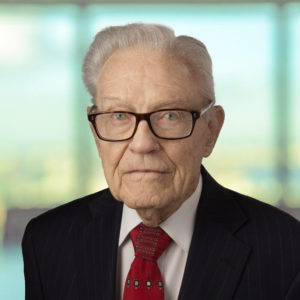Legacy of Texas Legal Legend
Amarillo attorney S. Tom Morris, a trial lawyer who won a precedent-setting Supreme Court case on patent infringement in 1966, died Monday, October 4. At 101 years of age, Morris was still engaged in an active practice at the Underwood Law Firm.
An Underwood colleague Slater Elza, said, “I have had the opportunity to handle lawsuits all over the state. It seems everywhere I go someone asks me about Mr. Morris. Then they tell me with both honor and affection how hard he prepared, what a gentleman he was, and how bad they lost to him at some point in their career. He is our reminder that we can do our job efficiently and with grace and common courtesy while still protecting our clients’ interests. We are lucky to have been able to watch him and learn from him.”
Morris represented the John Deere Company in the patent infringement case of Graham v. Deere, which he argued before the Supreme Court on October 14, 1965. The case was decided for John Deere on February 21, 1966, and since then, has been cited more than 30,000 times and reaffirmed by the Supreme Court three times.
The case established what is known as the obviousness doctrine, whereby a patent claim is obvious when the differences between the claimed invention and the prior art “are such that the subject matter as a whole would have been obvious at the time the invention was made to a person having ordinary skill in the art.”
During Morris’ final year of law school at the University of Texas, he enlisted in the U.S. Navy. Following the bombing of Pearl Harbor in 1941, he served four years in the Navy, flying airplanes off an aircraft carrier in the Pacific Ocean.
Ken Fields, an Underwood colleague, said, “Mr. Morris was a consummate professional. I always felt, after his experiences as a Navy pilot in World War II, where he flew off of the aircraft carrier Ticonderoga every type of fighter plane and dive bomber the Navy had, that law practice at the highest level was, to him, child’s play by comparison.”
Morris returned to law school after the war, graduated in 1946, and stayed to serve two years on the faculty. In an interview for the Texas Bar Foundation, Morris recounted the time when the University of Texas established a separate law school for African American students, and he was assigned from the faculty to teach the Torts class for the first class of three students.
Morris said, “I remember the Daily Texan interviewed me and asked for my comments about it. One of my comments was that, well, I was glad we were doing it, but I didn’t see why we just didn’t go ahead and admit them to the law school. That was kind of a revolutionary statement to make in those days of segregation battles. Kenneth Culp Davis, who was a very liberal-thinking faculty member, came to my office first thing the next morning when my remarks appeared in the Daily Texan. We were good friends. He said, ‘Tom, I wish I’d been able to say that. I didn’t have the guts to say that.’”
Also during that interview, Morris was asked what he liked best about being a trial lawyer. He said, “I like to compete, and I genuinely love the law. I think the law is the most challenging profession in the world. It’s just fun. I enjoy it as much today as I did 50 years ago. It’s a privilege to practice law, and I think I run scared all the time. I’m afraid that I’m not going to have everything that I should have done, have my witnesses ready or have every bit of my law ready for the trial. It’s a challenge right up from the beginning of a trial until you get through in the Supreme Court.”
At the end of the interview, Morris said, “My family is first, and I could not have done what I have done without the constant and loyal support of my wife, Estella. But the law is second, always has been. Whatever success I’ve had, I think the reason is that I’ve dedicated myself to the law and the practice of law.”
His Underwood colleague Kelly Utsinger said, “Tom Morris was the trial lawyer’s trial lawyer. His extraordinary courage and heroism in WW II transferred well into a fearless, formidable courtroom advocate. For 75 years, the law was his professional life and he lived it to the fullest, rising to unparalleled levels of achievement and commanding universal respect for his ethics, collegiality, analysis, briefing and trial skills. Practicing with him or against him made you think he didn’t just know the law – he created it. And considering his years of practice, he may have. With equal fervor, he was committed to his family. His wife and daughters were his greatest treasures. He is irreplaceable as a great husband, father and lawyer and as our partner in the Underwood Law Firm.”
Morris was elected to the elite Fellowship in the American College of Trial Lawyers in 1973. In 2001, he received the Chief Justice Charles L. Reynolds Lifetime Achievement Award from the Amarillo Area Bar Association. In 2005, he was honored by the Texas Bar Foundation as one of five outstanding Texas lawyers with more than 50 years in practice.
“Underwood has been honored to be associated with a Texas Legal Legend – an official designation by the Litigation Section of the State Bar of Texas,” said Underwood President Gavin Gadberry. “Mr. Morris made us all better lawyers by his example and instruction. He will be missed.”


